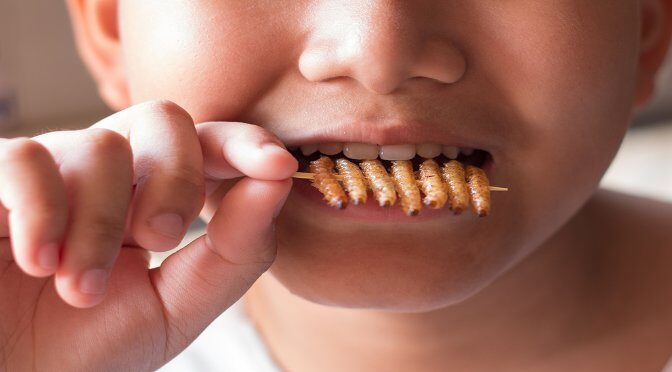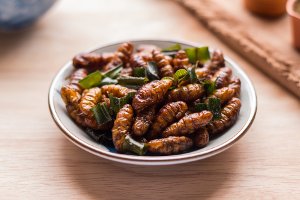The United Nations recently estimated that by 2050 the global population could reach a staggering nine billion. As it stands, there are vast numbers of people who are unable to find enough food for themselves and their family. The situation is already unsustainable, and if we continue to consume food in the way we do in the West the situation is only likely to get worse.
Our gluttonous diets, which have led to unprecedented levels of health issues, have also led us to the brink of humanitarian and environmental catastrophe. The over-consumption of beef and pork means that of the 78 million acres of rainforest that are chopped down every year, around half is for livestock grazing, which is the greatest contributor of greenhouse gasses. Our dietary habits have to change.
There is one solution that has been backed by nearly every governing body charged with the question of sustainability – eat bugs. Just reading the sentence is enough to make most people shudder and recoil. However, incorporating insects into our diet is not only good for the planet, but it is also great for our health. So why is there such a strong stigma against doing so?
Cultural perceptions
Eating insects and other invertebrates is nothing new. From the time of the first human beings, we have eaten bugs as part of our diet. Even today, over two billion people regularly consume invertebrates in their meals. It is largely the cultures of far-east Asia, Africa, and Central America that continue the practice, where some ‘creepy crawlies’ are actually eaten as a delicacy.
In western society, we moved away from eating insects regularly around 10,000 BC when the earliest known form of agriculture began in the Middle East. The region has become known historically as the ‘fertile crescent’ due to its link to early farming and its favorable weather conditions, in comparison with humanity’s ancestral home in Africa.
As our species began farming, bugs shifted from being a delicious part of our diet to being a farmer’s greatest pest became a culturally held view. No longer tied to having to hunt and gather, agriculture turned us away from our insectivore roots, as we sought to protect the plants that we grew and the animals we ate.
Without the need to eat bugs, and as we continued to push our society on in the name of progress, insects shifted even lower in our cultural opinion, moving from unwelcome pest to abhorrent vermin. For many of us, the idea of crunching down on an insect is detestable.
Thankfully cultural perceptions do have a way of shifting very quickly. As little as 100 years ago, the idea of eating lobster (also an invertebrate) was considered unthinkable, and it would often be thrown away as bycatch by fishermen. Now it is sold as a delicacy in some of the finest restaurants in the world. Even sushi wasn’t eaten widely in western society until around twenty years ago. A societal shift of the same proportion regarding eating insects could have a significant effect on us individually and as a species.
Bug benefits
There are quantifiable humanitarian, environmental and health benefits to eating bugs. All three benefits are closely linked meaning that if more of us were to alter our diets, the impact would be clearly seen.
Humanitarian and environmental
Firstly, the farming of insects takes a comparatively small amount of space in comparison with cattle farming. Rather than having to chop down vast swathes of untouched ecosystems, small insect farms can be set up in indoor facilities. These farms are inexpensive to run and can be set up easily by farmers, particularly in a hot climate where much of the developing world lies. By setting up these farms there would be a boost to the local economy, whilst also protecting the natural environment.
The inexpensive nature of an insect farm comes down to the fact that for the sheer amount of meat that they could produce, the creatures themselves need less water than traditional livestock and they can be fed on the byproducts of agriculture, as well as dinner table scraps. These factors would mean that almost anyone could set up their own farm for a very little cost, all whilst producing almost zero methane emissions.
Each farm could also build up and maintain its numbers far quicker than any cattle farm, due to the rapid breeding pattern of invertebrates. For example, the common house cricket produces as many as 1,500 eggs every four weeks. This rapid population growth is in stark contrast to a cow’s nine-month pregnancy. Insect-farms would provide more food, more quickly, but with less expense on the part of either the farmer or the consumer.
Dietary benefits
The environmental and humanitarian benefits would undeniably help the average person through savings and the general improvement of the planet we live on. There are also further advantages to be had if you can overcome your culturally instilled insect phobia.
Insects are packed with many of the same nutrients as other meats. For every 100g of house crickets you consume, there is 21g of protein, which is a similar level to the 26g in beef. However, the sacrifice you make in the tiny reduction in protein is more than made up for by the huge difference in the calorie content of the two meat sources. Insects contain over 300% fewer calories than beef.
The limitation of calories leads to a lessened risk of obesity and the side effects that it causes; such as heart disease and cancer. These factors work for your health alongside the high levels of fiber, healthy fats, and vitamins that insects possess. In particular, they contain over five times the amount of vitamin B than traditional livestock.
Most insects all possess more iron than beef. Considering that iron deficiency causes one of the fastest growing illnesses in the US, anemia, they could be a hugely significant untapped resource in the overall health of our society.
Getting over the ‘ick’ factor is the most difficult obstacle in the way for many of us to truly consider eating bugs. However, as the clock ticks on towards a projected nine billion people on this planet and our diet continues to be the root cause of many serious illnesses, the question will soon change from whether we should eat insects? To why didn’t we?!
This article was written by The Hearty Soul. The Hearty Soul is a rapidly growing community dedicated to helping you discover your most healthy, balanced, and natural life.
Sources:




